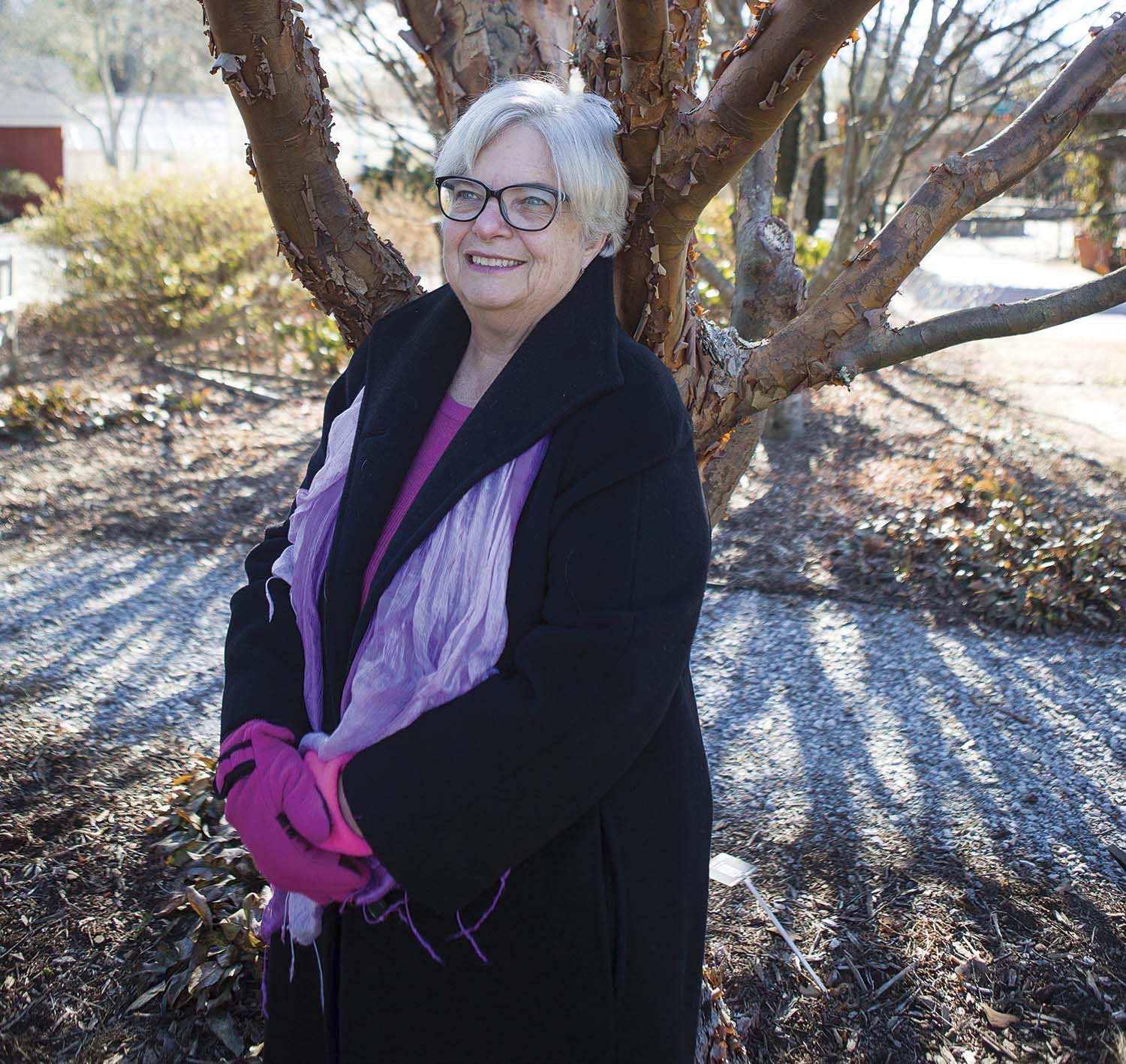
Lynn Hurst makes her fairy tunics and pixie vests via a technique known as Nuno felting, where wool fibers are bonded to lighter fabrics. Photo by Tim Robison
Moss Hollowe Farms already has a fairytale appeal, as does the fiber art made there. Fittingly, the most high-profile residents of the place — a rare Gotland sheep herd — are celebrated in fantasy literature. J.R.R. Tolkien saw a flock in northern England and was so enthralled, he envisioned his Elvish cloaks to be made of Gotland wool: “Grey with the hue of twilight under the trees they seemed to be; and yet if they were moved, or set in another light … dusk-silver as water under the stars.”
Located down a twisty, tree-lined road in upstate South Carolina, Moss Hollowe is in an area evocatively dubbed the Dark Corner (due to its mountain topography and stories of 19th-century lawlessness). There, shepherdess-artist Lynn Hurst and her husband have carved out a charming home in rolling hills for a menagerie of chickens, ducks, guinea fowl, peacocks, goats, and sheep (not to mention rescue cats and dogs), from which she produces fresh eggs, goat-milk soaps, and strikingly ethereal, felted sheep’s-wool garments. For the past several years, Hurst has sold the latter under the product line Fairy Moon by Moss Hollowe at area festivals and online; now she has a permanent brick-and-mortar presence at Hendersonville’s A Walk in the Woods shop on Main Street.
These clothing items conjure fantasy tales of their own, with richly layered Brothers Grimm–style cloaks, wild knit hoods, garden-inspired “fairy tunics,” and delicately detailed “pixie vests” among the regular offerings. Hurst uses a technique known as Nuno felting, where the wool fibers are loosely bonded with sheer, gauzy fabrics to create a lightweight, subtle felt backing. She incorporates vintage fabrics and beads into her designs so that no two pieces — even if the template is the same — are ever identical. Her process, she notes, is more akin to sculpting than sewing; the fabric is coaxed into the shape and weight she wants using the pressure of her hands.

Lynn Hurst’s Moss Hollowe Farm in Landrum, part of Upstate SC’s fabled “dark corner” region, is populated with a rare Gotland sheep whose fleece she uses to make delicately felted wearables, sold in Hendersonville. Photo by Tim Robison
Hurst has long harbored an affinity for fairies and their apparel, but she didn’t turn to fiber artisanship in earnest until acquiring the first flock of sheep — her “practice set,” as she puts it — which were rescued from a shuttered petting zoo in Shelby. “I had no idea about the possibilities or how obsessed I would later become,” she recalls.
A renovated garage — complete with glass atrium and working kitchen — serves as Hurst’s expansive studio, and a growing number of barn structures offer cozy, shipshape shelters for the animals, viewed foremost as family pets. The first flock of sheep included Shetland, Jacobs, Tunis, and Babydoll, and since then Hurst has added Bluefaced Leicester and a Teeswater cross to produce a variety of fleeces, from soft and loose to tightly crimped. While searching for the perfect breed to start her second flock, Hurst read a description of the Gotland variety in Sheep! magazine — and later found the atmospheric Tolkein quote.
But bringing Gotlands to Moss Hollowe turned out to be no simple task. No pure Gotlands exist in the U.S., and very few crossbreeds. At the time, virtually all of those were on the West Coast. Hurst was finally able to have a small flock of 75-percent Gotlands transported to South Carolina from Oregon. Then, she acquired a 100-percent strain of Gotland seed and artificially bred the ewes; the first generation of Moss Hollowe Gotlands are 87.5-percent pure. Hurst is now a member of the American Gotland Sheep Society, organized to help the breed gain a foothold in the U.S.

Handmade fiber gloves by Lynn Hurst. Photo by Tim Robison
Ironically, despite the challenges of obtaining Gotlands, they are one of the easiest breeds to raise, with a long lifespan. Their fleece is particularly loved by felters for its strong, smooth surface, though it can also be spun into fine or chunky yarn. She keeps some fleeces in their natural, washed state or in curly, individual locks, while others, of course, are carded into roving to be felted, hand-dyed in a spectrum of fairy-appropriate colors.
Hurst first sold Fairy Moon in spots like Tryon’s Old Mill Market, Art on the Trail in Travelers Rest, and at the national FaerieCon. But the February opening of A Walk in the Woods, and a close collaboration with owner and fellow fiber artist Quantella VanDerVeer, has grounded her enchanted creations in a proper, practical home.
A Walk in the Woods is located at 423 North Main Street, Hendersonville, 828-577-6277. For more information about Moss Hollowe and its goods, see mosshollowe.com.

